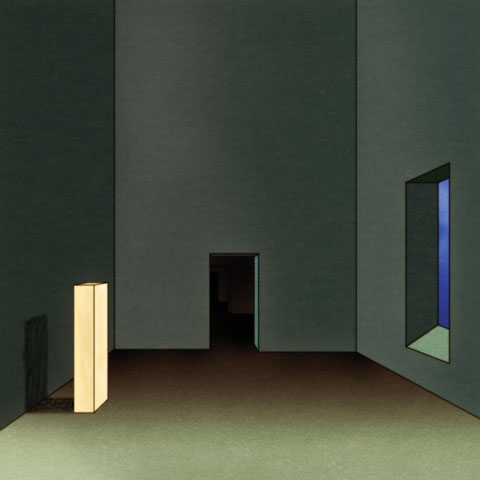Oneohtrix Point Never, "R Plus Seven"
 Much of Daniel Lopatin's work has been characterized by uncertainty. Even in his best moments, there was a hesitance, an aversion to commitment which staggered the fluidity of his material. In his initial presentations of synth arpeggios, there was the voice of a burgeoning artist struggling to move past process, to bridge the gap between idea and execution, to make a full measure. On R Plus Seven, Lopatin has fully realized this goal. Filled with a stupefying sureness, this record once again finds Daniel reinventing his style from the ground up, combining the dated provinces of new age music, soundtracks, and corporate ambience into something tremendous.
Much of Daniel Lopatin's work has been characterized by uncertainty. Even in his best moments, there was a hesitance, an aversion to commitment which staggered the fluidity of his material. In his initial presentations of synth arpeggios, there was the voice of a burgeoning artist struggling to move past process, to bridge the gap between idea and execution, to make a full measure. On R Plus Seven, Lopatin has fully realized this goal. Filled with a stupefying sureness, this record once again finds Daniel reinventing his style from the ground up, combining the dated provinces of new age music, soundtracks, and corporate ambience into something tremendous.
There are plenty of critical approaches to Oneohtrix Point Never's music, but they are rarely as interesting as the music itself. I might find a keen satire of zealous consumerism in his use of stock choir pads and chintzy muzak pianos, a laughing mockup of music from the soulless recesses of the dot-com bubble. Or, barring that exhausted approach, I could argue for an embrace of the kind of surreal futurism new age music had promised, a genuine appreciation for the art of unfettered idealism. But R Plus Seven really ought to be examined for the music alone—the innate beauty of the record upon first listen. I am instantaneously able to understand the order and chaos in the universe Lopatin has built with R Plus Seven. It is an experimental release by most standards but it is also strangely, undeniably pop.
In speaking on his creative process, Daniel Lopatin seems to entertain ideas of irreverence and simultaneously a strict working order. In minutiae, it is the former; R Plus Seven lives as a series of variables, finicky and fleeting, a compendium of far-flung, seemingly irrelevant detritus. Sudden bursts of inspiration jut in and out, and the best melodies never last long enough. There is a very direct attempt at reworking each song on this album into a frail and fractured thing; each time an order seems to be established, there will be a transition into choral drone or a sudden glottal stop that cuts it short of its inevitable crescendo, breaking it apart into fragments. But in a larger picture these pieces are the most structured work he has ever done. It is a difficult effort to find commonality between disparate pieces, but each song on this release shares a (sometimes subconscious) fraternity. The piecemeal construction makes a huge logical leap in what normally comprises a song, but in taking that leap it opens up a whole new approach to Lopatin's craft. I find myself listening to the record over and over again, bent on discovering those patterns and links with giddy bemusement. It is a triumph of function over form, and as a result the form becomes the new normal.
"Boring Angel" opens the album with a solemn drone, a jittery triplet of voices, a sudden dropout into silence, and a nonsequitur church organ. The sampled choir, a defining instrument of the album, is the most accessible entry point to this album but eventually becomes the most alienating. I have not heard something so deeply nestled in the uncanny valley in a long while, nor as purely fun. Following that is the spectacular "Americans," with its smeared microsamples and anxious clutter giving way to jubilant polyrhythmic percussion and a major key gear shift in the final minute. "Zebra" is possibly my favorite song off the record, an electrifying upbeat staccato synth pulse rolling along in conjunction with a human choir made android by granular time stretching. It then collapses, as if following the unwritten motions of a choreographed dance, before settling into a quiet peace in its latter half.
There are too many perfect bits to mention in this review, despite my want to include all of them. Among the best small wonders: the "wait" signifying the slowing of "Problem Areas'" clanging metal loops, the swung shaker beat on "Cryo" that I just cannot quite pin down, and the completely phantasmagorical climax of "Still Life," made all the more unnerving by its accompanying video, a Jon Rafman-directed spectacle of fetish horror and gratuitous digital flesh. There is a moment in "Chrome Country" where all other noise drops out and a solitary choir voice freezes in place, and I am stuck in time with it. It is at once coldly mechanical, like a program running out of memory, and warmly cathartic, human as a strained voice pushed past its physical limits. In essence, this is R Plus Seven's modus operandi: the natural/unnatural dichotomy, finding human qualities in mechanical sounds, and how well Daniel Lopatin manages to accomplish that feat.
I think the strongest praise to be said for R Plus Seven is that for all its cuts and edits, all its obtuse conceptual ambling and strangeness, it is a fully realized piece of music. In Replica, I could spot the moments where a stronger choice might have been made or a punch had been pulled. Likewise, Lopatin's early work on Rifts and thereabout was very much a fluid, improvise-then-edit kind of gradual product. R Plus Seven is immaculate; I cannot spot a piece that can be moved without ruining the puzzle. Lopatin has found an inspired path, happier and braver, run amok with grand ideas, and imbued with explosive potency. Outstanding, fantastic stuff.
Samples:



